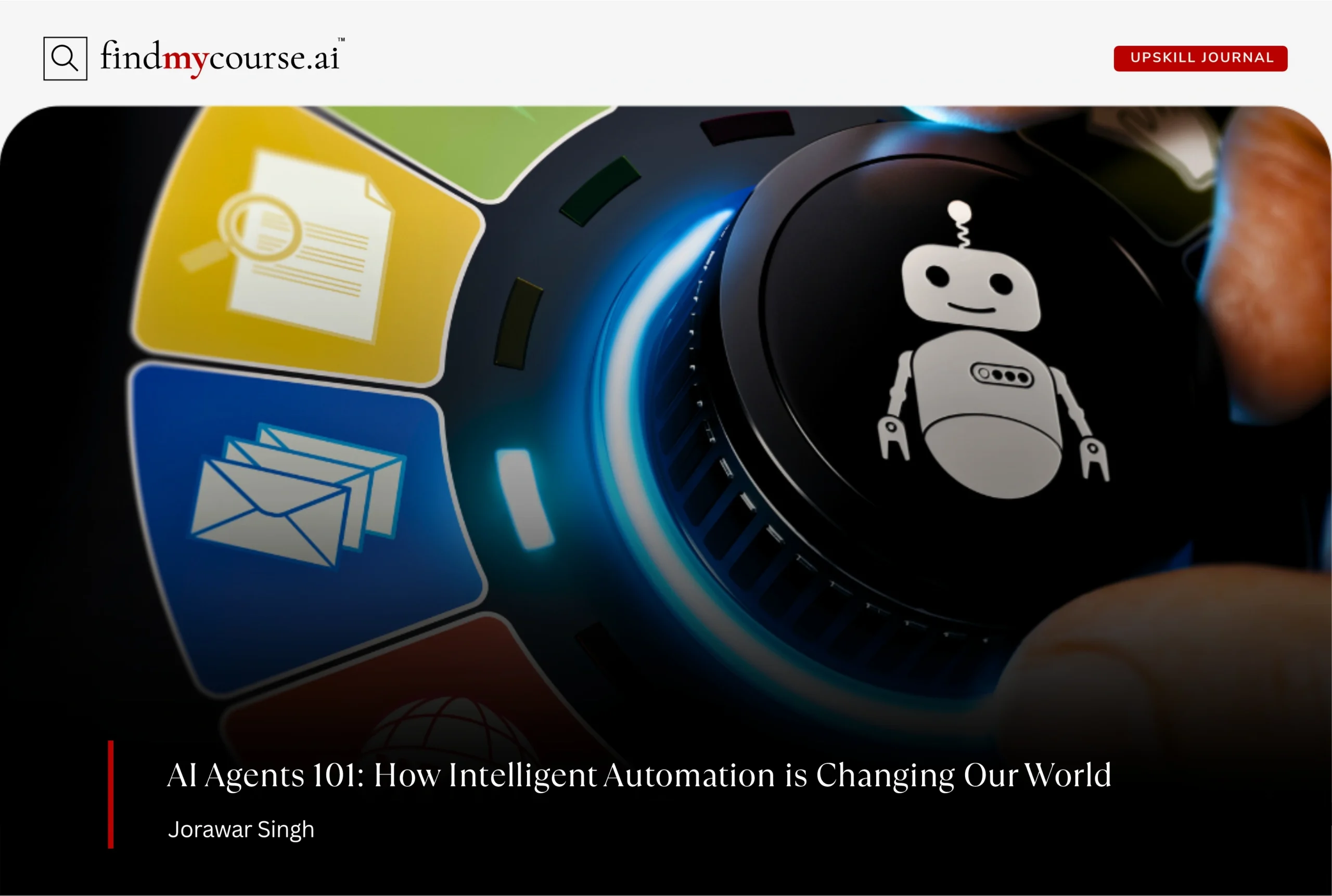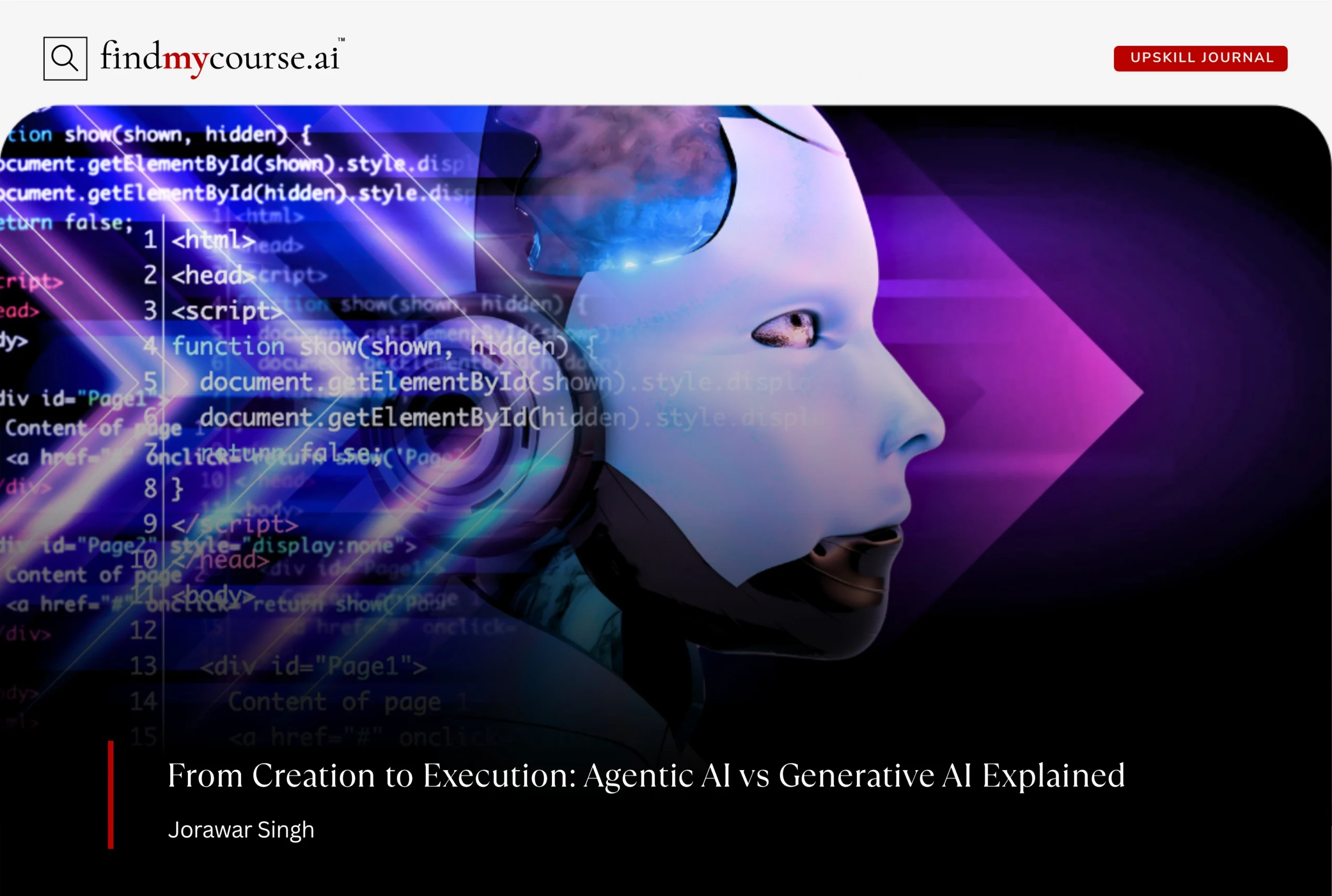The future of work is arriving faster than expected—and it’s bringing a new kind of digital teammate with it. Automation is no longer just about speeding up routine tasks; it now includes advanced systems called ai agents that can think through problems, make decisions, and act independently. Because industries are changing rapidly, many professionals are choosing to upskill to stay confident and competitive in this new landscape. When you understand how these agents operate, you’re better prepared to adapt, innovate, and support smarter business outcomes.
In this guide, you’ll explore what ai agents are, how they work, and why they’re becoming essential in today’s workplaces.
What Are AI Agents? Understanding the Basics
AI agents are smart software systems designed to take in information, decide what to do with it, and then act toward a goal. At their core, they follow a simple cycle: they observe, they think, and they respond. This makes them very different from traditional tools that only follow fixed rules.
Instead of waiting for step-by-step commands, these systems study signals from their environment—like text, data, images, or user activity—and choose the most useful action on their own. For instance, a scheduling tool that arranges meetings, resolves conflicts, and adjusts plans automatically is acting as a digital agent. It doesn’t just follow instructions; it interprets the situation and decides the best move.
You can find these systems in many everyday tools, such as:
• Customer support chat assistants that solve simple issues automatically
• Productivity apps that sort emails or organize tasks for you
• Recommendation tools that learn your preferences over time
Understanding these basics makes it easier to see how different types of agents work and why they’re becoming so important in modern automation.
Types of AI Agents: From Simple to Advanced
There are several types of agents in AI, and each type has its own level of intelligence and independence. Understanding these groups helps you see how AI is improving over time. From simple rule-followers to systems that learn and adapt, each agent plays a different role in modern automation.
| Type of AI Agent | How It Works | Simple Example |
| Simple Reflex Agents | Respond instantly to what they sense. They don’t use memory or think about the future. They follow direct “if this, then that” rules. | A thermostat that adjusts temperature the moment it senses a change. |
| Model-Based Agents | Use both current inputs and stored memories. They understand how the world works and make decisions using this internal model. | A robot vacuum that remembers room layouts and avoids obstacles. |
| Goal-Based Agents | Choose actions that help them reach a specific goal. They think ahead and compare different paths to decide the best one. | GPS navigation finding the fastest route to your destination. |
| Utility-Based Agents | Evaluate options and choose the one with the highest overall benefit or “utility.” They balance different possible outcomes. | Financial tools selecting investments with the best long-term benefit. |
| Learning Agents | Improve over time by studying results, learning from mistakes, and adjusting their behavior automatically. | Self-learning personal assistants like advanced voice or task helpers. |
Together, these agent types show how AI grows from simple reaction-based tools into intelligent systems that can plan, learn, and adapt, making them more useful and capable in real-world situations.
How AI Agents Differ from Traditional Automation
Traditional automation is rule-based. It follows exact instructions and repeats tasks the same way every time. While this works well for predictable jobs, it falls short when things change.
AI agents work differently. They adjust their actions based on context. Moreover, they can handle unexpected situations without waiting for someone to reprogram them. This makes them far more flexible and reliable in real-world environments.
For example, traditional automation might sort documents by reading a fixed set of keywords. If a document doesn’t match those rules, the system gets stuck. In contrast, an AI agent could analyze the content, understand patterns, and sort the document correctly—even if it’s new or unfamiliar.
Another major difference is learning. Traditional systems never improve but these agents do. They learn from past results, update their approach, and become more accurate over time. Consequently, businesses using AI systems see fewer errors, smoother workflows, and faster results.
Finally, AI systems scale more easily. Traditional automation often breaks or slows down as tasks grow. AI agents adjust naturally, making them ideal for companies that want to expand or manage more data without increasing manual work.
Why AI Agents Are the Future of Automation
AI agents are becoming essential because they help people work faster, smarter, and with less stress. As companies deal with growing workloads and rising expectations, these intelligent helpers offer a strong advantage.
1. They Save Time and Reduce Workload
AI agents help people work faster by completing tasks that normally take hours when done manually. They can follow multi-step processes, switch between tasks, and stay consistent without losing focus. For example, HR teams can rely on an agent that screens resumes, sorts profiles, schedules interviews, and even sends reminders. Because these steps happen automatically, employees can shift their attention to strategic planning, creative problem-solving, and tasks that require human judgment. As a result, organizations experience higher productivity and smoother workflows with significantly less stress.
2. They Improve Decision-Making
AI agents strengthen decision-making by turning overwhelming amounts of information into clear, usable insights. Instead of guessing or relying on outdated data, teams gain guidance based on live trends and learned patterns. This leads to smarter predictions and fewer costly mistakes
| How AI Agents Improve Decisions | What It Means in Practice |
| Analyze large datasets rapidly | Businesses no longer wait days for reports; insights appear in seconds. |
| Compare different outcomes before acting | Agents evaluate risks, benefits, and alternate paths automatically. |
| Learn from past patterns | They adapt forecasting models to improve accuracy over time. |
| Provide real-time recommendations | Teams get immediate support for choices in marketing, supply chain, and finance. |
3. They Personalize Experiences
They can personalize user experiences by:
• Studying preferences and behavior patterns
• Tailoring messages, product suggestions, or lessons
• Adjusting content based on a user’s pace or style
• Offering support that feels more human and relevant
Today’s customers expect brands and platforms to “know” them. AI agents make this possible by customizing interactions in real time. Whether someone is shopping, learning, or exploring an app, the agent adjusts recommendations to match their needs. This not only improves satisfaction but also builds loyalty and trust, because users feel genuinely understood and supported.
4. They Help Teams Work Better Across Departments
AI agents connect information from different parts of an organization, making teamwork smoother and more efficient. Instead of employees searching across systems, the agent gathers everything—reports, updates, customer data, and deadlines—and presents it clearly. This removes delays caused by miscommunication or missing information. Additionally, these agents can:
• Highlight issues before they become problems
• Share insights across teams instantly
• Automate follow-ups and reminders
Because of this cross-department clarity, teams collaborate faster and make decisions with complete, accurate information.
5. They Support the Future Workforce
AI agents act like reliable digital partners in the modern workplace. They organize schedules, track project progress, send smart reminders, and automate repetitive tasks that often drain energy. Consequently, employees can concentrate on deeper, more meaningful responsibilities such as innovation, strategic thinking, and creative work. As workplaces continue to evolve, these agents help people adapt to new tools and processes more easily. This reduces stress, boosts productivity, and makes professional life more balanced, especially in fast-moving or highly digital environments.
Key Challenges and Ethical Points to Consider
AI agents bring powerful benefits, but they also come with responsibilities. To use them safely and fairly, companies must pay attention to how these systems collect data, make decisions, and interact with people. A thoughtful approach ensures trust and long-term success.
Key Challenges to Address
• Protecting privacy: AI agents rely on data, so organizations must secure personal information, limit access, and follow clear rules to prevent misuse.
• Ensuring fairness: These systems should make unbiased decisions. Regular testing helps teams identify and fix problems early.
• Avoiding over-dependence: While helpful, AI cannot replace human judgment. People still need to monitor outcomes and guide important choices.
• Maintaining transparency: Users should understand how decisions are made, especially in areas like hiring or finance.
• Upskilling teams: Employees need new skills to work confidently with AI. With training and learning opportunities, teams can adapt and collaborate effectively alongside intelligent tools.
Conclusion
AI agents mark a major shift in how modern work gets done, bringing learning, adaptability, and smart decision-making into everyday tasks. They help teams save time, reduce errors, and operate with greater confidence as automation becomes more advanced across industries. As organizations continue adopting these tools, professionals who stay informed and build the right skills will be better prepared for a fast-changing future. The key is to stay curious, stay adaptable, and explore how these systems can support your goals—and if you ever need guidance getting started, our AI assistant is here to help.


